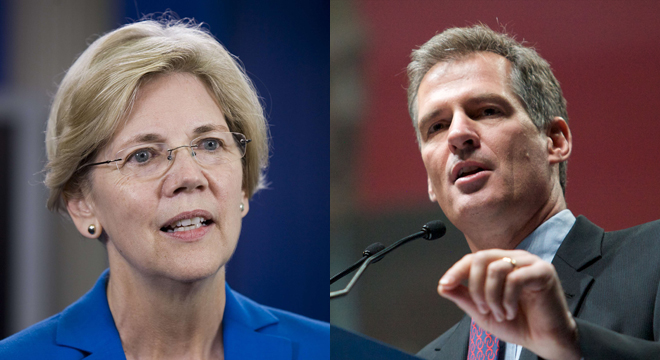Updated June 19, 3 p.m. ET
Republican Sen. Scott Brown’s terms for debating Democratic nominee Elizabeth Warren at the Edward M. Kennedy Institute in Massachusetts were rejected Tuesday, a move that prompted Brown to pull out of the event altogether.
The Kennedy Institute rebuffed the Brown campaign’s demand that Vicki Kennedy, widow of the late Sen. Ted Kennedy and president of the institute named in his honor, pledge to not make any endorsement throughout the Senate race.
“This non-endorsement pledge is unprecedented and is not being required of any other persons or entities. To us, such a pledge seems inappropriate when a non-media sponsor issues a debate invitation,” Kennedy Institute chief operating officer Lisa McBirney and chief of staff Christopher Hogan wrote in a letter released Tuesday.
Brown’s campaign manager Jim Barnett said in an open letter to the institute on Monday:
As the President of the Board of Trustees, Vicki Kennedy assured us in her June 8 letter that the Kennedy Institute is “non-partisan” and would therefore be an appropriate setting for a Senate debate. In order to proceed, we need to know that in keeping with the spirit of neutrality expressed in Vicki Kennedy’s letter that she will not endorse or otherwise get involved in this race.
In their response, McBirney and Hogan noted that Kennedy would not even be asking any actual questions and that similar events were commonplace:
Given the goodwill and understanding of the non-partisan mission of the Institute that Senator Brown has thus far shown, it seems inconsistent that he would now attempt to restrict the activities of Mrs. Kennedy as a condition of accepting a debate that is co-sponsored by an organization with which she is affiliated.
Massachusetts, like many states, has a long history of media-sponsored debates, and quite often, the media outlets that co-sponsor them, such as the Boston Globe and the Boston Herald — or The Des Moines Register, for that matter — also endorse candidates.
That explanation did not satisfy the Brown camp — instead, it prompted Barnett to reject the debate altogether.
“We respect Vicki Kennedy’s decision but we regret that we cannot accept a debate invitation from someone who plans to endorse Scott Brown’s opponent,” Barnett said in a statement to TPM. “The Kennedy Institute cannot hold itself out as a nonpartisan debate sponsor while the president of its board of trustees gets involved in the race on behalf of one of the candidates.”
The Brown camp had also asked for another stipulation. While Brown accepted the choice of Tom Brokaw as moderator, he wanted MSNBC to withdraw as a sponsor. Barnett declared that “we prefer debates with local media sponsors, not out-of-state cable networks with a reputation for political advocacy.”
On this point, the Kennedy Institute indicated a degree of flexibility. McBirney and Hogan wrote that they could hold the debate on a feed available to all Massachusetts stations — and from there, any national cable network could pick up the feed, presumably including MSNBC.






